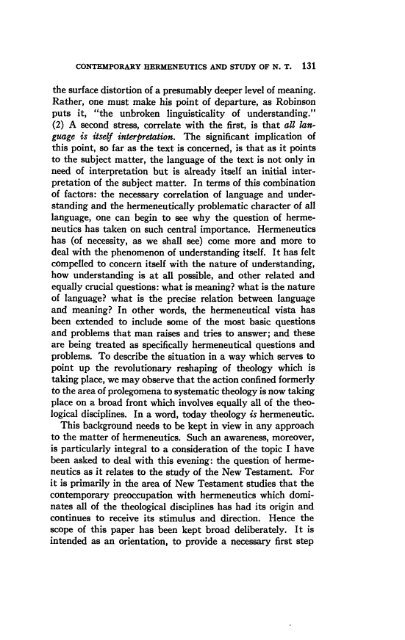NEW TESTAMENT THEOLOGY
Issues%20in%20New%20Testament%20Theology
Issues%20in%20New%20Testament%20Theology
You also want an ePaper? Increase the reach of your titles
YUMPU automatically turns print PDFs into web optimized ePapers that Google loves.
CONTEMPORARY HERMENEUTICS AND STUDY OF Õ. T. 131<br />
the surface distortion of a presumably deeper level of meaning.<br />
Rather, one must make his point of departure, as Robinson<br />
puts it, "the unbroken linguisticality of understanding."<br />
(2) A second stress, correlate with the first, is that all language<br />
is itself interpretation. The significant implication of<br />
this point, so far as the text is concerned, is that as it points<br />
to the subject matter, the language of the text is not only in<br />
need of interpretation but is already itself an initial interpretation<br />
of the subject matter. In terms of this combination<br />
of factors: the necessary correlation of language and understanding<br />
and the hermeneutically problematic character of all<br />
language, one can begin to see why the question of hermeneutics<br />
has taken on such central importance. Hermeneutics<br />
has (of necessity, as we shall see) come more and more to<br />
deal with the phenomenon of understanding itself. It has felt<br />
compelled to concern itself with the nature of understanding,<br />
how understanding is at all possible, and other related and<br />
equally crucial questions: what is meaning? what is the nature<br />
of language? what is the precise relation between language<br />
and meaning? In other words, the hermeneutical vista has<br />
been extended to include some of the most basic questions<br />
and problems that man raises and tries to answer; and these<br />
are being treated as specifically hermeneutical questions and<br />
problems. To describe the situation in a way which serves to<br />
point up the revolutionary reshaping of theology which is<br />
taking place, we may observe that the action confined formerly<br />
to the area of prolegomena to systematic theology is now taking<br />
place on a broad front which involves equally all of the theological<br />
disciplines. In a word, today theology is hermeneutic.<br />
This background needs to be kept in view in any approach<br />
to the matter of hermeneutics. Such an awareness, moreover,<br />
is particularly integral to a consideration of the topic I have<br />
been asked to deal with this evening: the question of hermeneutics<br />
as it relates to the study of the New Testament. For<br />
it is primarily in the area of New Testament studies that the<br />
contemporary preoccupation with hermeneutics which dominates<br />
all of the theological disciplines has had its origin and<br />
continues to receive its stimulus and direction. Hence the<br />
scope of this paper has been kept broad deliberately. It is<br />
intended as an orientation, to provide a necessary first step


